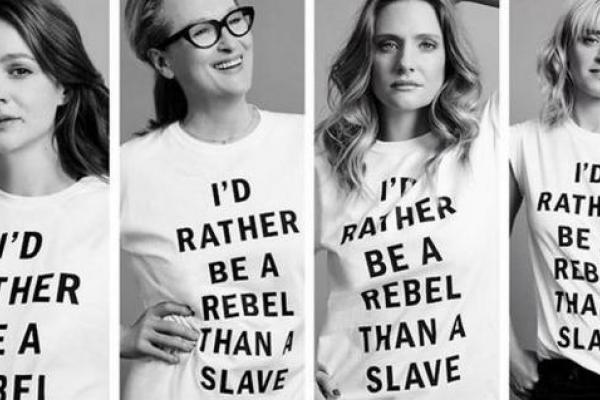The actresses behind Suffragette, the new Meryl Streep-Carey Mulligan film about the struggle to get women the vote in early 20th-century Britain, have landed themselves in hot water.
When asked if she would consider herself a feminist in an interview with Time Out London, Streep declined to take the label, saying instead, “I am a humanist, I am for nice easy balance.” That is one thing you can say when you are doing publicity for your feminist movie, but it has upset plenty of people — probably the very same people who would have been excited to see the movie when it is released on Oct. 23.
After the interview came out, Streep and her co-stars (including Mulligan, Anne-Marie Duff, and Romola Garai) came under fire for photographs of them wearing shirts emblazoned with the words “I’d rather be a rebel than a slave.” The statement is part of a quote from Emmeline Pankhurst, the British suffragette Streep plays in the movie.
The full quote reads: “Know that women, once convinced that they are doing what is right, that their rebellion is just, will go on, no matter what the difficulties, no matter what the dangers, so long as there is a woman alive to hold up the flag of rebellion. I would rather be a rebel than a slave.”
It’s a nice sentiment “in a bubble,” as Ira Madison III wrote over at Vulture. But neither Britain nor America exists outside of a bubble when it comes to things like rebels and slaves, and Streep or Mulligan or their publicists or someone in marketing ought to have thought of that before these women donned these shirts and posed with smiling faces.
“The message that Streep and company are co-signing,” writes Kirsten West Savali at The Root, “is that one cannot be both enslaved and a rebel; and tucked between those lines lies the erasure of a dual existence that black women have been forced to navigate in one form or another throughout history.”
White feminism in the West has a long history of erasure of women of color. When Pankhurst spoke the words she did, she was most likely pretty ignorant of what it meant to be a black woman in England. That mindset still plagues feminism to this day, so that the white women who too often grab the megaphones are unaware of or unwilling to listen to their sisters of color.
All of us — especially those of us who consider ourselves religious — have a duty to listen when we would rather speak, and to cede power where we would grab it. A slave can be a rebel, and a feminist can be aware of her shortcomings — but we have a long way to go.
Got something to say about what you're reading? We value your feedback!

